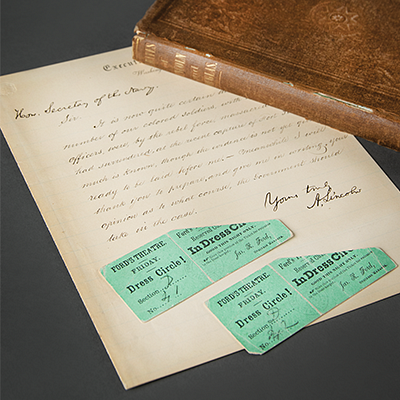Robert Oppenheimer Typed Letter Signed on Death of Albert Einstein
Two ways to bid:
- Leave a max absentee bid and the platform will bid on your behalf up to your maximum bid during the live auction.
- Bid live during the auction and your bids will be submitted real-time to the auctioneer.
Bid Increments
| Price | Bid Increment |
|---|---|
| $0 | $5 |
| $50 | $10 |
| $200 | $25 |
| $500 | $50 |
About Auction
Sep 23, 2023
RR Auction support@rrauction.com
- Lot Description
Brilliant American physicist (1904-1967) who directed the Institute for Advanced Study in Princeton and who spearheaded the Manhattan Project, leading to the development of the first atomic bomb. TLS signed “Robert Oppenheimer,” one page, 5.5 x 8.5, Institute for Advanced Study letterhead, May 20, 1955. Letter to Rafael Grinfeld in Argentina, in full: "On behalf of the Trustees and the Faculty of the Institute for Advanced Study, I wish to express our appreciation of your word of condolence on the death of Einstein, and our gratitude." He adds a handwritten postscript: "With warm thanks & greetings for your good words." In fine condition, with a faint block of toning.
Einstein's relationship with Oppenheimer has become the subject of renewed interest in light of its portrayal in Christopher Nolan's 2023 film: articles on the physicist icons and their collegial affiliation have recently appeared in Vanity Fair, GQ, Esquire, and other popular media outlets. After World War II, both lived and worked at Princeton—at the Institute for Advanced Study—where Oppenheimer served as director from 1947 to 1966.
Oppenheimer's relationship with Einstein is best described in American Prometheus: The Triumph and Tragedy of J. Robert Oppenheimer by Kai Bird and Martin J. Sherwin: 'He thought of Einstein as a living patron saint of physics, not a working scientist‰Û_Einstein harbored a similar ambivalence about Oppenheimer‰Û_But what he admired about Oppenheimer was the man, not his physics. Still, Einstein would never count Oppenheimer as one of his close friends, 'perhaps partly because our scientific opinions are fairly diametrically different.' Back in the 1930s, Oppie had once called Einstein 'completely cuckoo' for his stubborn refusal to accept quantum theory.'
However, their scientific differences of opinion did not preclude the two from enjoying each others' company. American Prometheus relates: 'Knowing Einstein’s love of classical music, and knowing that his radio could not receive New York broadcasts of concerts from Carnegie Hall, Oppenheimer arranged to have an antenna installed on the roof of Einstein’s modest home at 112 Mercer Street. This was done without Einstein’s knowledge—and then on his birthday, Robert showed up on his doorstep with a new radio and suggested that they listen to a scheduled concert. Einstein was delighted.' - Shipping Info
-
Bidder is liable for shipping and handling and providing accurate information as to shipping or delivery locations and arranging for such. RR Auction is unable to combine purchases from other auctions or affiliates into one package for shipping purposes. Lots won will be shipped in a commercially reasonable time after payment in good funds for the merchandise and the shipping fees are received or credit extended, except when third-party shipment occurs. Bidder agrees that service and handling charges related to shipping items which are not pre-paid may be charged to a credit card on file with RR Auction. Successful international Bidders shall provide written shipping instructions, including specified Customs declarations, to RR Auction for any lots to be delivered outside of the United States. NOTE: Declaration value shall be the item’(s) hammer price and RR Auction shall use the correct harmonized code for the lot. Domestic Bidders on lots designated for third-party shipment must designate the common carrier, accept risk of loss, and prepay shipping costs.
-
- Buyer's Premium



 EUR
EUR CAD
CAD AUD
AUD GBP
GBP MXN
MXN HKD
HKD CNY
CNY MYR
MYR SEK
SEK SGD
SGD CHF
CHF THB
THB












